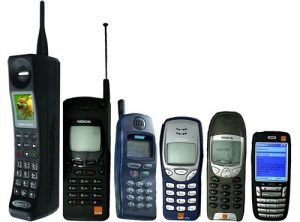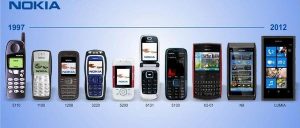The Story of Nokia
Vocabulary
| solid | stick (2) | astonish |
| ironic | stagnate | time and again |
| appear | handset | dominate |
| peak | bore (4) | worldwide |
| fad | dismiss | meanwhile |
| shake | blueprint | unshakeable |
| lazy | onward | touchscreen |
| touch | observe | complacent |
| decide | founder | come up with |
| trust | species | model (3) |
| sum | undoing | progress |
| adapt | scramble | challenger |
| release | beat (2) | overtake |
| reliable | venture | comeback |


Nokia
From the 1990s onward, Nokia dominated the mobile phone industry. At its peak, around forty percent (40%) of all handsets sold worldwide displayed the Nokia label; the Finnish company had a market value of $303 billion.
But all that changed in 2007.
The iPhone
In June of that year, Apple introduced the iPhone. The company’s co-founder and CEO, Steve Jobs claimed it would reinvent the phone and revolutionize the world.
The iPhone certainly did.
Meanwhile, instead of responding with their own version, Nokia dismissed the iPhone as a fad — a mere toy for teenagers, something not to be taken seriously.
Nokia’s management believed that their successful past would provide an unshakeable blueprint for the future . .
Fast Forward
In the six years since the iPhone appeared on store shelves, Nokia lost about 90% of its market value.
Not long after, in 2014, Microsoft bought Nokia’s phone division for $7.2 billion.
The Irony
Ironically it was actually Nokia — not Apple — that had invented a smartphone-like device, the Nokia 9000 Communicator. It had the features of a PC, complete with office software, web browsing and fax function. Their product hit stores in August 15, 1996, at a cost of about one-thousand four-hundred (€1,400) each.
Then in 2000, Nokia developed an even smarter phone, complete with a color touchscreen, maps, online shopping, etc.
However, it had never released this product into the market.
The Old Model
Instead, Nokia decided it was better to stick with their old, trusted device, the one that they knew worked — good, solid, reliable mobile phones that had made them Number One all those years.
However this proved to be their undoing.
Recently though, Nokia has made a comeback of sorts; among its ventures is 5G (fifth generation) wireless technology, and a new smartphone, the Nokia 6.



Questions
Smoke Signal, Drumbeats. Before 2007, Nokia was an ordinary company. True or false? Describe Nokia before 2007. What was Nokia like before 2007?
Letters, Mail. Was 2007 a watershed year? What happened in 2007?
Telegraph, Telegram. How did Nokia respond? What did Nokia do? What didn’t Nokia do?
Landline Telephone. Was this a mistake? Did Nokia make a big mistake?
Teletype. Was Nokia the same after 2007? What happened to Nokia after 2007?
Fax Machine. There is an irony about Nokia. Is this right or wrong?
E-mail. Is Nokia’s telecommunications section history now? Has it completely ended?
Beeper, Pager. What is the moral or lesson of the story? The English biologist, Charles Darwin said, “It isn’t the strongest or smartest species that survives, but the one most adaptive to change.” What does this mean?
Cell Phone, Mobile Phone. I have owned a Nokia cell phone. Is this true or false? What about your friends? Do you remember Nokia?
Smartphone. Are you surprised by what had happened to Nokia?
Messaging App. Can you think of other products or companies with situations similar to Nokia?
Video Conferencing Platform. Do you know of anyone who had a career similar to what had happened to Nokia?
Social Media Platforms. What will happen in the future?
Telepathy. What should people and companies do?
